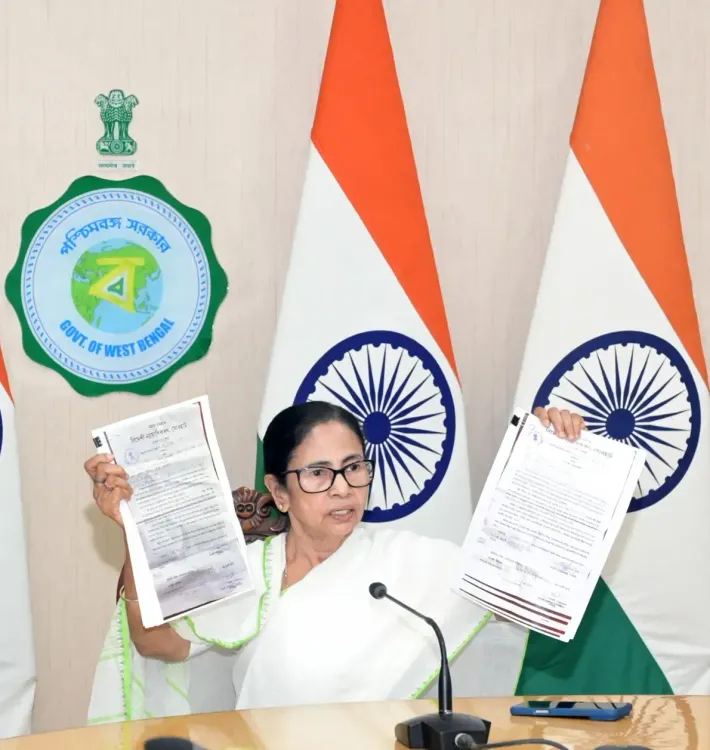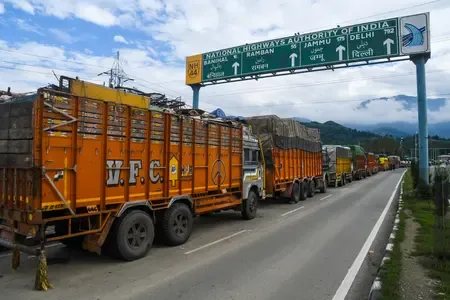Is the Organisational Reshuffle a Strategic Move by Trinamool Ahead of the Upcoming Elections?

Synopsis
Key Takeaways
- The bureaucratic reshuffle is viewed as a strategic move linked to upcoming elections.
- There are allegations of political motivations behind the timing of the SIR announcement.
- The electoral roll revision process is crucial for maintaining electoral integrity.
- Demographic shifts in West Bengal could influence political dynamics.
- Trinamool is attempting to balance leadership between veterans and younger members.
New Delhi, Oct 28 (NationPress) With the Assembly elections looming in West Bengal by May-June next year, every action taken by Chief Minister and Trinamool Congress Chairperson Mamata Banerjee will attract public attention. Consequently, the extensive bureaucratic reshuffle executed by her administration just hours before the Election Commission released the announcement regarding the Special Intensive Revision (SIR) of electoral rolls is perceived to be associated with the forthcoming elections.
This ongoing organisational transformation is seen as a strategic effort to fortify a party grappling with incumbency challenges, including allegations of corruption, indiscipline, and internal conflicts, which have occasionally escalated into physical confrontations after approximately 14-and-a-half years in power.
The administrative changes involve the relocation or reassignment of hundreds of officials across multiple districts. The government labels this as routine, asserting that many of these officials had exceeded a three-year tenure at their postings, necessitating a shift.
While it is a standard procedure to prevent any single officer from becoming a long-term local power broker, some sections perceive this decision as a redeployment of key officials to position administrators with established loyalty, capability, or responsiveness in crucial districts prior to the initiation of the SIR process.
Trinamool leaders have openly condemned the Election Commission's decision to conduct SIR in West Bengal, claiming that the process jeopardizes the integrity of legitimate voters and could be utilized to target specific communities for political gain.
They have characterized the initiative as “politically-motivated” and have warned of protests if valid voters are unjustly removed. They have expressed doubts about the fairness of the process and have linked its timing to the heightened political stakes leading up to the 2026 Assembly polls.
Nonetheless, the election authority has clarified that according to legal requirements, electoral rolls must be revised before each election or as needed. SIR has been conducted eight times from 1951 to 2004, with the last occurrence more than two decades ago between 2002 and 2004.
Issues like frequent migration resulting in voters being registered at multiple locations, the names of deceased individuals, and fraudulent entries of foreign nationals cannot be addressed during the standard revision process. Such modifications necessitate door-to-door verification at the booth level.
Reports from both administrative and media sources indicate a demographic shift in West Bengal, particularly in districts adjacent to Bangladesh, attributed to decades of influx through unregulated borders and alleged political complicity.
The economic influence and population increase among Muslims are reportedly reshaping local life, inciting tensions, as evidenced by this year’s violence in Murshidabad over the Waqf Amendment Bill.
Leaders from the ruling party assert their absolute dominance in such regions, as indicated by election outcomes. There have been reports of certain immigrants possessing voter identity cards and participating in the electoral process without legitimate citizenship. Such voters can be identified through the SIR process; however, the possibility of oversight or intentional interference at the grassroots level cannot be entirely dismissed.
In recent months, the Trinamool has instituted extensive organisational changes at the district level to create a balance between veteran leaders and emerging younger figures.
This reshuffle intends to diminish factionalism, enforce stricter oversight, and prepare the party structure for securing a fourth consecutive term.
It seems there is also an effort to strategically recalibrate from the “old vs. new” debate by blending prominent long-standing figures with younger representatives in organisational committees and future candidate lists.
The restructuring efforts have sometimes resulted in the dissolution of district president roles in favor of smaller, curated core committees. For instance, in Birbhum, Kolkata North, district-level leadership has transitioned from a single dominant figure to collective committees.
The party's organisational adjustments may be interpreted as a tactic to regain control, mitigate factionalism, and enhance candidate quality—changes anticipated to influence party decisions regarding nominations for the 2026 Assembly elections.









